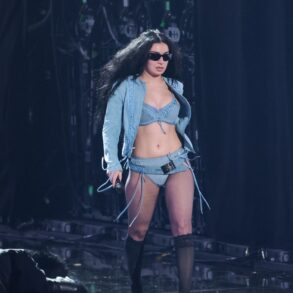Watch highlights from the 2025 GRAMMYs on live.GRAMMY.com.
The 2025 GRAMMYs telecast has been reimagined to raise funds for MusiCares Fire Relief, a dedicated campaign to support the people affected by the recent wildfires in the Greater Los Angeles Area. Donate now.
2024 was the year of Brat.
Charli XCX‘s fun, brash and vulnerable sixth album covered topics of self-doubt, female competitiveness, family planning, and the highs and lows of being an it-girl atop clubby, angular and unrelenting party beats. It channeled the chaos, joy and uncertainty of 2024 and was absolutely ubiquitous; anywhere you hear music, Brat crashed the party.
At the 2025 GRAMMYs, Brat took home golden gramophones for Best Dance/Electronic Album, and Best Recording Package while “Von Dutch” won Best Pop/Dance Recording. Charli performed her winning single and album cut “Guess” for the Ceremony’s closing performance, turning the Crypto.com Arena into a mini rave for her GRAMMY stage debut.
Loading…
While Charli has never shied away from bringing vulnerability and a range of emotions to her lyrics — taking things much deeper and realer than your average radio hit — she remains an expert at crafting party-starting dance-pop anthems. “My music is intrinsically for the night,” she explained on Bowen Yang’s “Las Culturistas” podcast. She got her start performing her so-called “MySpace music” at London raves as a teen and fell in love with the free-spiritedness and DIY culture of the underground rave culture. Nearly two decades later, she’s synthesized that into perfectly messy and chaotic dance music mainstream.
But it wasn’t just the raw, upbeat music that captivated large swaths of the general public, “brat” became an aesthetic; a lifestyle, muse and meme that was endlessly explained on the internet (everyone from presidential candidate Kamala Harris to NATO to the NYC MTA used brat memes to varying degrees of efficacy). In fact, Collins Dictionary named brat — which it defined as “characterized by a confident, independent, and hedonistic attitude” — the word of the year. Given the largely fragmented cultural world we live in, the ubiquity and wide appeal of Brat / “brat” is impressive.
If you’re still not sure what this all means, Charli said it best: “You’re just that girl who is a little messy and likes to party and maybe says some dumb things sometimes. Who feels herself but maybe also has a breakdown but kind of parties through it. Is very honest, very blunt. A little bit volatile, does dumb things but it’s brat. You’re brat. That’s brat.”
Read more: Charli XCX’s Road To ‘Brat’: How Her New Album Celebrates Unabashed Confidence & Eccentricity
Brat and the multi-tiered album campaign that came with it — a collab-laden remix album, concert pop-ups, and a February 2024 Boiler Room DJ set that foretold the year of brat — catapulted Charli XCX from a more niche “alt-pop” star to a capital-P popstar. And not only was Brat and its iconography culturally ubiquitous in 2024, it was critically lauded, earning album of the year ratings from New York Times, Rolling Stone, Billboard and many others.
Charli XCX one of the most nominated artists of the upcoming 2025 GRAMMYS, with seven nods (following only Beyoncé and tied with Billie Eilish and Kendrick Lamar). These are her first GRAMMY nominations in a decade and her first ever as a solo artist.
Brat had more than just a summer, but why? Why this Charli XCX album over her last album Crash, which she has called her mainstream pop “sell out“? GRAMMY.com sat down with Brat producers A. G. Cook, Finn Keane and George Daniel to dive deep into the magic, creation and wide appeal of Charli XCX’s Brat.
This interview has been edited for clarity.
This Is Charli’s Most Charli Album
A year ago, you were among the small group of people creating one of the defining sounds of 2024. In your lives, was there a before and after Brat?
A. G. Cook: It’s just so interesting being on this journey with Charli from the mixtapes Number 1 Angel and Pop 2 in [2017]; they’re kind of full-circle but completely different with what’s happened with Brat. It’s still really the same Charli. There’s so many of the same goals and the same attitude and approach to things, and now to have a larger mainstream [audience] is really interesting for how uncompromising it is. For me personally, it proves that’s even possible within pop music.
Finn Keane: It has actually felt like a bit of continuation of what we’ve been doing already. It wasn’t this radical shift of doing something new. I think that’s just really communicating the work that everyone’s been trying to do for years. And it feels like Charli’s felt like the most comfortable. It’s definitely been a refining and distillation process, and this has been a real apex of that process.
George Daniel: It’s always funny when you’re so in the weeds of something, you’re the last people to know that it’s happening. Me and Charli were chatting the other day about pre-Boiler Room New York. She was talking about the concept, and how all of the promo initially was DJ-led and [how we wondered] whether that would be possible, and whether I would be down for being a part of it. It was very much a pipe dream, but quickly became very legit. I don’t think there’s a defining moment. I would say pre- and post-Boiler Room for sure — it was also the scariest thing that any of us had done for quite a while.
Charli Is a Deft Pop Songwriter
Why do you think Brat resonated so widely? Is it because she really leaned into messiness and uncertainty, or is it Charli being the most Charli?
Keane: Brat does feel like the most Charli album that has been made yet. I think everyone feels that and that’s communicated clearly. [Brat] is just so distilled. It’s just all these things coming together to make something special and make something resonate in the way that it has.
Cook: Charli’s a proper songwriter as well as a pop star. She has so many songs; it’s given her so much ammo over the years. She also has a lot of goodwill with other artists. You look at the people who were down to collaborate on the remix album or on shows because they see her either as someone who’s also a writer or will collaborate with them. I think the fan base also has some of that goodwill because she’s been a bit more transparent and amusing, from How I’m Feeling Now to talking about Crash.
Daniel: I think there was also a perfect amount of familiarity and new, exciting and stimulating things happening all at once. There was always something to bring somebody in because it was so specific and personable. Again, vulnerability, conviction and some specificity that someone had probably thought a million times but that had never been articulated so directly at that scale. You could love the heartache and turmoil and the clearly kind of mad internal dialogue that runs through the whole thing, which is so, so relatable. And that being juxtaposed with super high energy [music], there’s such a spectrum that it covered.
The internal dialogue was the thing for me. It’s fun; I can run to it, I can dance to it, and there’s this narrative of, I’m on top of the world, but I’m still kind of losing my mind a little bit.
Daniel: Totally, that’s why the Lorde song [“So Confusing”] is so special. That, for me, was one of the most brilliant moments in culture that I can remember for a long time. People were really blown away by that. That amount of honesty and letting your guard down hasn’t happened in a long time, and especially not partnered with something, like, really aggressive and bombastic at times. It’s just a big old hybrid of things and the cacophony of it that is very relatable to what we all experience in our brains, constantly.
Charli Works It Out On The Remix
“Brat” was the guiding principle for whether a song made the album or not; take me deeper into the album sessions. How was the studio process either different from or similar to past ones with Charli?
Keane: For me, it felt very similar, it was a real continuation. Charli likes to work very, very quickly. That’s something that actually me, Alex and Charli all have in common, we love to work super quick.
Cook: You can labor over it later, but in terms of the writing and the general idea…
Keane: Exactly. In the initial process we can make a track in 10, 15 minutes. We’ll get a whole load of her vocal passes and then chop it up. We might have something that resembles a song in 30 minutes. That’s always been the process with Charli. Afterwards, she’ll really work on lyrics and perfecting melody and structural stuff, and then we can go away and work on production.
There’s definitely a lot of labor and meticulous thinking that goes into it afterwards, but that first process has always been super quick. I’m very [into] following the immediate inspiration of an idea, rather than laboring over something. If it’s not working, we’ll just move on and try a new idea.
For example, we did “Von dutch” on the same day that we did “Speed Drive” for the Barbie movie. We’d done “Speed Drive” early in the day and maybe spent two or three hours finishing it. Then I had this track that I wanted her on, and she just did maybe four or five vocal takes on it. That was how we took “Von dutch” and then it turned into this bigger idea.
Cook: Keeping first takes is wild as well. I think “Girl, so confusing” is the first one we did for Brat. It was the end of the Crash tour and we were doing a session in Mexico, but she was losing her voice from doing all the touring. The concept was for it to be sort of iMessage style. They were all first takes, and then she didn’t really sing or speak the rest of the day, which is just funny. We had to use that, obviously, we’re not gonna recreate that energy. So that is literally what’s on [the song]. The [vocals were] done on the day where by the end of verse two she’s literally, “I can’t anymore.”
And full-circle with the Lorde remix; Ella [Marija Lani Yelich-O’Connor, a.k.a. Lorde] wrote that on the day the album’s released, genuinely in real-time. That wasn’t a planned thing, it was really Charli texting her, “By the way, there’s no bad feelings, but this song is kind of about us” and Ella’s like, “Well, I could write a verse.” When she sent it over to us, I was also trying to keep that immediate [energy], trying to use as many of the first takes [as I could]. So at the beginning and the end, there’s a lot of this kind of capturing lightning in a bottle.
My favorite thing to do with Charli is to almost remind her of the immediacy of the early stages of the project. When she’s starting to overthink, I’ll send her versions of tracks that are jarringly different. “Everything is romantic” was started by [former Rosalía producer] El Guincho and then I came in. In a way, I’m kind of trolling it a little bit and seeing how far I can push it to keep the Boiler Room remix energy, and to get rid of some of that fatigue a little bit. Often, it’s trying to bring back this element of surprise and improvisation.
Keane: Alex is so right about this idea of surprise. The nature of the remix album was that, that we could throw random ideas or variations at her. I’m so grateful for how receptive Charli is; if you have an idea or want to take it somewhere else, she’s super down for that. She’s not micromanaging every detail. She allows you to throw a curveball at her, and then she can completely roll with it, whether that’s on the writing side or production side. That’s always been a really exciting part of working with Charli.
Daniel: Charli was quite vocal on Crash about the creative process being slightly different in terms of exploring the more commercial side—not of the music but more so utilizing the major label resources, and taking more suggestions than she [usually] would. But you still have to make music for you as an artist, and Brat just had so much of that, where it’s just so unapologetically Charli.
I found the process so straightforward because I knew how special the whole project was, I just had so much trust in her. Whenever I was unsure of anything in terms of production or writing, she’s so honest and her instinct is so immediate. It takes her split seconds to know whether something’s resonating.
Brat = Messiness & Vulnerability You Can Dance To
What is the brat sound? Is it this element of surprise, of remix energy?
Cook: There’s no one I’ve worked with more than Charli, so it was useful to have some limitations in terms of the palette, in terms of tools. Now, all those rules got broken. But it was always broken with the intention of how it musically justifies messing with its limitations. We were talking a lot about minimalism versus maximalism in a thematic way; having only a few elements [that] could be really big, so you fill up the space. Charli wanted lyrics that not just felt really brutal in some way, or honest, transparent or diaristic. I don’t think there are any lyrical compromises actually, she was really adamant about it.
Keane: I was really thinking about this idea of something both feeling very slick and shiny, but also completely messy and chaotic. What communicates that is very simple and minimal sound design. By putting such an extreme spotlight on one sound or Charli’s vocal, it then fills up the space and has a kind of unfinished feeling to it, but also a boldness and a slickness to it, a clarity to it. And I think that tension of having both those things at once really summed up the spirit of the album.
And the other thing, as Alex was saying, is the 180 turns. There’s one bit that’s super dry, there’s another bit that’s super wet; there’s the piano breakdown in “Mean girls,” there’s “Apple” in the track list. It’s all these things happening together, like “360” being paired with “Club classics.” And lyrically as well; you have a song that could be so confident, cocky, arrogant, and then the most vulnerable, self-loathing thing you’ve ever heard. Those being put next to each other, that combination of an extremely slick projection and then an incredibly messy and chaotic kind of B-side to that. Having both of those things sit together and not trying to downplay one of them to make a slick transition, just allowing that extreme transition to sit — that, for me, felt like the core spirit of the album.
Daniel: There’s a spectrum of sounds or ideas that a song had to tick off — whether it’s the extreme end of hard-hitting or the super intimate end of things. From a more technical side of things, there was this super abrasive kind of plastic sound to a lot of the synths and a lot more distortion than previous Charli work. Not that she hadn’t done that before; a lot of the SOPHIE stuff was very much — I mean, I would never compare my work to SOPHIE because she was the greatest.
There are SOPHIE references; the legacy of working with her feels present on Brat.
Daniel: I think Charli would agree, but it almost feels like a love letter to her. It was very prevalent at times with “So I” and other moments, but I think it was probably more of a deeper subconscious thing that was a bit of a North Star.
The album opens with “360” and closes with its manic cousin “365,” which Barack Obama picked for his 2024 summer playlist. How do these two songs serve as a thesis statement of sorts for Brat‘s sound and aesthetic?
Cook: “360” was a song that happened really quickly when Charli was very focused about the kind of thing that she wanted to make. And “365” was a DJ edit that I had made for a really small club night that we did. I thought it would be fun to start DJing things from this, even though it was slightly too early. I sped it up basically by one semitone, which is a little bit awkward. It’s a funny thing to just have it slightly faster, slightly higher pitched. As soon as Charli heard that, it fit that idea of taking the party too far, or it being this manifestation of walking through something in these physical spaces.
As soon as we started recording her on “365,” I was pretty fixated with it being the first and last track. I really loved the idea of coming full-circle, but not being continuous. I didn’t want it to blend back in, I wanted the end of “365” to be exhausting and slightly too long. [Chuckles.] Then you could go back to “360,” the simpler times when the beat only dropped once.
Keane: There was a really funny moment in the process when we were working on material for the Boiler Room and remixing “365.” It’s really kind of ridiculous; a remix of a remix of a remix. Does it eventually just become “360” again by accident?
Cook: It was so key because your version [inspired] the name for Partygirl, Charli’s club night, the DJ unit version of Brat.
Why do you think Charli was able to bring underground dance music influences to the mainstream and bridge the worlds of dance and pop in such a seamless way?
Daniel: I’ve thought about it a lot. A big part of this resurgence in dance music — which predates Brat a little bit — was post-lockdown, everyone felt that being in a room full of people with incredibly loud music was a very authentic way of being super present. Conviction is always the thing that’s paramount [with her]. Whatever Charli does there’s such a weight behind it, whether it’s something incredibly intimate and vulnerable, like “I might say something stupid,” or “So I.”
Keane: Me, Alex, Charli and a bunch of our friends have all been thinking about this for a really long time: How do you make strange dance music that’s experimental and weird, but at the core there’s still a mutant song in there? That’s always for me been the core spirit of what we’ve all been trying to do: How do you make something that feels strange, dancey and could be played in the club, but still functions like a pop song?
Cook: Pop and dance music are both quite hard to define. Despite that, since I’ve done DJ sets at small club nights, I’ve used pop music to make my dance music more interesting. And since I’ve become a pop music producer, I’ve been using dance music to make pop more interesting.
The only way that I’m truly interested in genre is in all the paradoxes in it and how it can pull one thing away from another. It’s never going to satisfy someone thinking that this is a strict dance music record, but at the same time, it’s obviously not a strict pop music record. It exploits the fact that both of those terminologies are pretty flawed, and there’s also a real fun in not taking it too seriously.
Based on Brat‘s nominations across dance, pop and the new Best Dance Pop Recording category, I feel like the Recording Academy also acknowledges that it is both and all things.
Cook: Genre is doing so many things. Has a [new] genre been created? The whole hyperpop word or PC Music and other things…. What’s cool is Charli’s not operating on that micro local level, but she is trying to bring this certain time and place at an almost international level, and use things like the internet and a painted wall in New York to give it some local kind of feeling. That’s where the genre stuff actually starts to get interesting.
Keane: Charli was really drawn to [the fact that] dance music has a real life to it. It’s associated with an event, a club night. The Partygirl shows actually bring it out of the streaming space. It tied it to a real event that’s taking place, with a community. That was used in all these ways in the [Brat album] rollout, to develop in a more spontaneous or real way, with the pop-ups, for example.
Cook: It wouldn’t have worked if she had just announced it as a dance-inspired record and then didn’t do any of the stuff that Finn mentioned — the Boiler Rooms, the pop-ups, the remix album — that fits very easily into a kind of dance music space.
Charli’s Your Favorite Reference, Baby
It’s a new year, but there’s a Brat arena tour this year — brat is never ending. How do you think Brat will impact pop music going into the next year or so?
Keane: I think that someone trying to copy the sonic of it will feel really cheap. The thing that I think really will influence stuff going forward is the way the campaign worked. I also think lyrical honesty will definitely take hold; a kind of rejection of this very slick songwriter-y, rhyming couplet style, [replaced] with a much more direct, raw and conversational lyrical style. I can already feel people taking that forward with the music they’re working on now. A fearlessness in relation to that, of really saying the crude thing that’s on your mind.
Cook: Obviously that kind of lyricism has existed in different ways, but someone like Charli who’s so naturally hooky, she’s synthesized it into something else. There’s something about how she’s navigated the catchiness and the production of the vocals; it’s being messed with but it’s still really raw. There’s something that Charli has really found the right alchemy for and I think that is going to be quite an easy reference point.
Keane: It’s cool that if someone did try and copy Brat it would be so see-through. It’s a testament to the fact that it’s such a clear vision. It’s quite singular in that regard. That’s something everyone can be proud of.
Has she started working on new stuff?
Cook: Not truly, it’s just loose chatting about things. [For Charli] the genesis of things is really about having an idea but then being very impulsive. I think you need a certain amount of space to do that.
Keane: Chatting to Charli now, there is a desire in her to do the complete opposite thing again, which is very in keeping with her ethos. Some of the conversations we’re having and music we’ve been playing around with the last couple of months have been completely the opposite. I love that spirit. It’s the iconoclastic impulse to rebuild something completely different, to show that you actually could do this other thing, this whole other side of your artistry.
It’s been really funny, in the months after finishing the remix album, any other musical discussion that has taken place has been kind of anti-Brat. I doubt that’ll stick, but that’s been a really interesting thing to observe and makes me very optimistic and excited about [what’s next].







